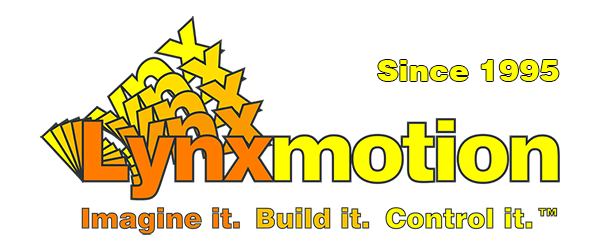Changes for page LSS Mechanical
Last modified by Eric Nantel on 2024/07/12 11:24
Change comment: There is no comment for this version
Summary
-
Page properties (1 modified, 0 added, 0 removed)
Details
- Page properties
-
- Content
-
... ... @@ -3,12 +3,14 @@ 3 3 4 4 {{toc depth="3"/}} 5 5 6 -= LSSFeatures =6 += Features = 7 7 8 +With the LSS (Lynxmotion Smart Servo) we incorporated some features which make sense for Robotic applications. Bellow are some of the main features present on the LSS. 9 + 8 8 |(% colspan="2" style="width:350px" %)((( 9 9 == Driving Horn == 10 10 ))) 11 -|(% style="width:350px" %)[[image:LSS - driven horn.png]]|The aluminum driving horn is connected to the output shaft of the final gear in the gear train which islocated within the servo. This output shaft has a specific cross section called a “spline” (specificallythe “male” version of the spline), and the driving horn has the mating “female” spline. The details of the spline are found below. The driving horn is held in place using an M3 x 8mm pan head machine screwand has the SES standard mounting pattern described below.13 +|(% style="width:350px" %)[[image:LSS - driven horn.png]]|The aluminum driving horn is connected to the output shaft of the final gear in the gear train located within the servo. This output shaft has a specific cross section called a “spline” (the “male” version of the spline), and the driving horn has the mating “female” spline. The details of the spline are found below. The driving horn is held in place using an M3 x 8mm pan head machine screw. 12 12 |(% colspan="2" style="width:350px" %)((( 13 13 == Spline == 14 14 ))) ... ... @@ -29,7 +29,9 @@ 29 29 == Case == 30 30 ))) 31 31 |(% style="width:350px" %)[[image:LSS - case.png||width="400"]]|((( 32 -The black plastic case which forms the body of the servo is made up of three sections: the top (highlighted in yellow), the bottom (opposite the driven horn and highlighted in orange), and the middle / center. All three case components on the high speed and standard servos are made of injection-molded ABS plastic, whereas the middle case on the high torque is machined aluminum, anodized black. There are four screws located on the bottom case holding the servo together. Opening the servo without express permission from RobotShop / Lynxmotion staff will void the warranty. There are many threaded inserts in the top and bottom case, and their specifications and functionality are described below. 34 +The black plastic case which forms the body of the servo is made up of three sections: the top (highlighted in yellow), the bottom (opposite the driven horn and highlighted in orange), and the middle / center. All three case components on the high speed and standard servos are made of injection-molded ABS plastic, whereas the middle case on the high torque is machined aluminum, anodized black. There are four screws located on the bottom case holding the servo together. Opening the servo without express permission from RobotShop / Lynxmotion staff will void the warranty. 35 + 36 +There are many threaded inserts in the top and bottom case, and their specifications and functionality are described below. 33 33 ))) 34 34 |(% colspan="2" style="width:350px" %)((( 35 35 == LED Bar == ... ... @@ -45,7 +45,7 @@ 45 45 |(% colspan="2" style="width:350px" %)((( 46 46 == Connector == 47 47 ))) 48 -|(% style="text-align:center; width:350px" %)[[image:LSS - Connectors.png||width="250"]]|There are two male four-pin 2.54mm (0.1") spaced MOLEX connectors located on either side of the servo. The connector is "keyed" toprevents mating except with a correctly oriented matching connector, and there isno locking mechanism. The pins are GND, VCC+, Rx (servo receive pin) and Tx (servo transmit pin). The order of the connector pins is reversed from one side of the servo to the other52 +|(% style="text-align:center; width:350px" %)[[image:LSS - Connectors.png||width="250"]]|There are two male four-pin 2.54mm (0.1") spaced MOLEX connectors located on either side of the servo. The pins are GND, VCC+, Rx (servo receive pin) and Tx (servo transmit pin). The order of the connector pins is reversed from one side of the servo to the other. In order to receive or send a command / signal only one side needs to be connected. The other connector need only be used when adding another servo to the chain. 49 49 |(% colspan="2" style="width:350px" %)((( 50 50 == Button == 51 51 ))) ... ... @@ -96,4 +96,5 @@ 96 96 |(% style="width:350px" %)[[image:LSS - Dimensions 1.png||width="400"]]| 97 97 |(% style="width:350px" %)[[image:LSS - Top & Bottom.png||width="400"]]| 98 98 103 + 99 99

